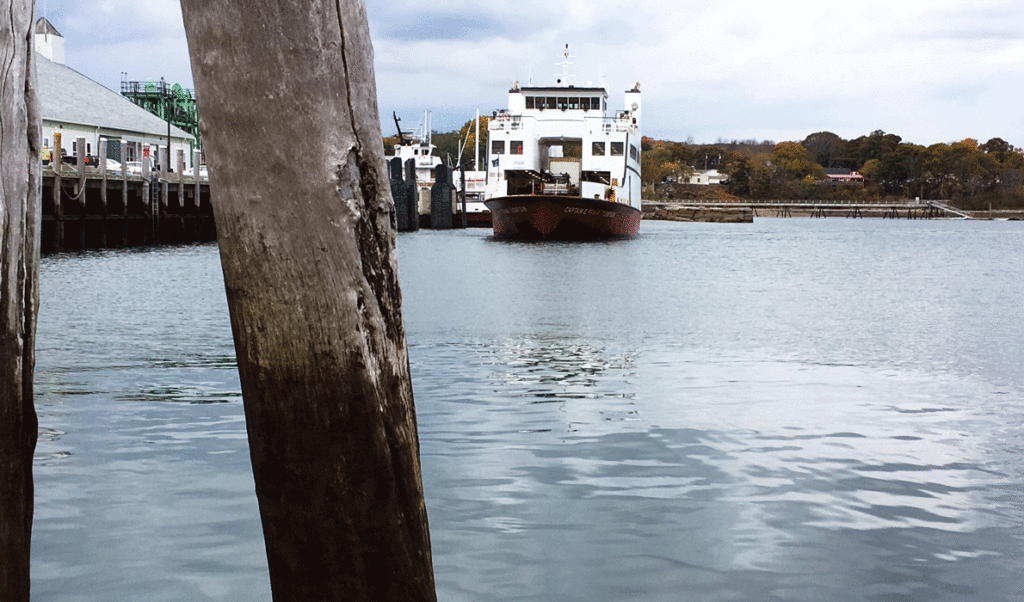By Tom Groening
Citing safety concerns and the need to comply with federal regulations, the Maine State Ferry Service has adopted changes in policy and schedule.
One sweeping change across the service—which links Matinicus, Vinalhaven, North Haven, Islesboro, Swan’s Island, and Frenchboro to the mainland—will mean passengers in their cars will no longer be able to run their vehicle engines while the ferry is underway. That new policy has more impact on passengers than might be thought—a driver sitting in a car for the 75-minute trip to North Haven on a cold February afternoon would want to run the engine to heat the vehicle.
The concern is that a vehicle could mistakenly be put in gear.
Ferry service managers explained the changes at the Nov. 1 meeting of a citizen advisory board, and also released a lengthy report recounting the process that led to the changes.
Another change affects the Vinalhaven-Rockland run.
Beginning Nov. 4, the 4:30 p.m. runs to and from Vinalhaven were eliminated, so the last boat for those returning to the island will depart Rockland at 3:15 p.m. and the last boat off-island also will depart at 3:15 p.m. The 4:30 p.m. runs will resume in March.
Islanders say the change will impact those who work on the mainland but return to Vinalhaven each night, and contractors, medical practitioners, and others doing work on the island will have to end their days sooner.
The changes in policy and schedule followed complaints from six ferry captains about what they saw as dangerous conditions approaching the Vinalhaven ferry pen in dark. Beginning this time of year, the boat arrives on-island after sunset. Exacerbating the problem, ferry service manager Mark Higgins has said, are LED lights on a float near the pen, which make it hard for the ferry captain to see the approach.
In late September and through October, the ferry service, along with representatives of the U.S. Coast Guard and Vinalhaven town officials, met to assess the safety concerns.
The ferry service report notes the Rockland-to-Vinalhaven run, at 75 minutes, “is the service’s longest daily route … and undoubtedly the most navigationally challenging. Even in good weather conditions, the last 30 minutes during the approach … are demanding due to the narrow and shallow channels…”
Captain and crew fatigue at the end of 12-hour days also impact safety, the report notes. Twelve-hour days are the maximum allowed under federal regulations.
“The risk of human error compounds with every passing hour,” the report asserts, “as fatigue sets in on the captains and crew, and the risk of an accident … escalates as the day wears on.”
Over the last 30 years, the report continues, there have been ten ferry groundings in the approach to the island. The 4:30 p.m. boats were added to the schedule in 2009.
During discussion of the LED lights on the float near ferry pen, the further glare that came from vehicle headlights on the deck, as passengers started their engines in anticipation of disembarking, was mentioned. Coast guard officials were surprised to learn that ferry captains and crew allow car engines to be started, because federal regulations prohibit their operation while the ferry is underway.
The ferry service will now enforce the policy of no vehicle engines running while the boat is moving. Captains are empowered to make drivers and passengers leave vehicles and ride in the ferry compartments, said Jennifer Smith of the Department of Transportation, and can insist that only drivers are in vehicles as they are moved aboard, but she said the service has discretion on such matters and isn’t likely to implement such measures.
Vinalhaven Town Manager Andy Dorr asked whether ambulances with patients could operate their engines while underway.
“There is no exception,” Higgins said.
“We’ve been in violation of federal law,” said DOT’s Dale Doughty.
The schedule change seems to be more objectionable than the vehicle engine rule. Vinalhaven resident Lindsay Davis, who traveled to the mainland to attend meetings at which the schedule change was discussed, said input didn’t seem to have been valued.
“I wasted seven hours of time to give input what was really not considered,” she told service managers, and asserted that the decision to change the schedule was made before the meetings began.





